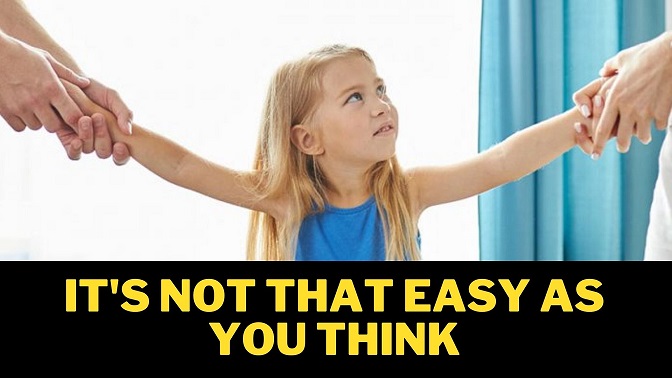At what age can a child decide which parent to live with
Parents who are getting a divorce must decide who will be the primary residential parent, and who will have parenting time visitation with the child. However, if the parents are unable to agree on child custody on their own, a judge will decide for them.
The question of whether a child can choose which parent will be their primary residential parent, which one they will visit is, and how old they must be to make that choice.
As the generation has changed and evolved over the past years, so has the mind of the people and the judiciary too. The age of a child to be considered his/her preference for custody is different for all countries.
Conflict often arises when children express their own desires. Our law recognizes that children should be allowed to voice their opinions, wishes, and preferences on questions such as where they should live if they are of an appropriate age.
Before we go so far I want to share something with you all if you are a parent you need to know about.

So this is just a coincidence that I am writing on this topic. Today I got a list of topics on which I have to write on, there are more than 500 topics and it is just a coincidence that this topic came to my part.
I am also from one of those children who is living with a single parent as my parents also got divorced a long time ago.
I am the one who believes that if a couple does not want to live together if they are not happy with each other then it’s good to live happy by separating. I never feel that divorces are bad.
I believe that “It’s better to be separated than living together and make each other’s life hell.”
Besides that what I have said above I personally feel like no fixed age determines when a child can express a preference as to where they want to live.
I, as a child never could decide to whom I want to live with? That time of course I was matured enough to choose the best for myself, I mean at least as per the law s I was 18 + I could make a decision.
At what age can a child decide which parent to live with, in British Columbia
And now if you ask me if I am happy with my decision, I will so no. It is not because my mother is not taking care of me or not good with me, no please do not misunderstand she is the best mom. But I equally love my both parents and if someone will ask me to choose one what will I do?
It is not that easy to choose one of them. I want to live with both of them but they do not wish to live together, so I can not say anything to them, I can not even express that feeling because I do not want them to live together just for my happiness but somewhere deeper inside after a long time I still wish that we could live together.
Depending on the age of your child, you may want to get their input into this decision. However, their wishes and feelings and any decision you make may not be legally binding.

Each case is therefore dependent on circumstances and the personal competencies of the child involved.
Factors to consider when assessing a child’s competency include cognitive ability, biological and mental age, level of maturity in comparison to peers, ability to understand, comprehend and answer questions, and school grades, also parent-child relationship.
Whenever possible, parents are allowed to come to mutual agreements that determine how their children care for overtime.
When that doesn’t work out, the decisions are made by court officials and court orders are issued.
At what age can a child decide which parent to live with, in British Columbia
Under the law of BC, A child is under the age of 19, and any decisions about the time the child will spend with their parents have to be in the best interests of the child.
[su_accordion][su_spoiler title=”The Best Interests of the Child” open=”no” style=”default” icon=”plus” anchor=”” class=””]
(1)In making an agreement or order under this Part respecting guardianship, parenting arrangements or contact with a child, the parties and the court must consider the best interests of the child only.
(2)To determine what is in the best interests of a child, all of the child’s needs and circumstances must be considered, including the following:
(a)the child’s health and emotional well-being;
(b)the child’s views, unless it would be inappropriate to consider them;
(c)the nature and strength of the relationships between the child and significant persons in the child’s life;
(d)the history of the child’s care;
(e)the child’s need for stability, given the child’s age and stage of development;
(f)the ability of each person who is a guardian or seeks guardianship of the child, or who has or seeks parental responsibilities, parenting time or contact with the child, to exercise his or her responsibilities;
(g)the impact of any family violence on the child’s safety, security, or well-being, whether the family violence is directed toward the child or another family member;
(h)whether the actions of a person responsible for family violence indicate that the person may be impaired in his or her ability to care for the child and meet the child’s needs;
(i)the appropriateness of an arrangement that would require the child’s guardians to cooperate on issues affecting the child, including whether requiring cooperation would increase any risks to the safety, security or well-being of the child or other family members;
(j)any civil or criminal proceeding relevant to the child’s safety, security, or well-being.
(3)An agreement or order is not in the best interests of a child unless it protects, to the greatest extent possible, the child’s physical, psychological and emotional safety, security, and well-being.
(4)In making an order under this Part, a court may consider a person’s conduct only if it substantially affects a factor set out in subsection (2), and only to the extent that it affects that factor
[/su_spoiler][/su_accordion]
At what age can a child decide which parent to live with, in California
If a child is at least 14, the law allows the child to state a custodial preference, unless the judge believes doing so would be detrimental. Although the law specifically permits children at least 14-years-old to express an opinion, there is no specific age when a judge will listen to a child’s opinion.
[su_accordion][su_spoiler title=”The law on deciding custody and visitation” open=”no” style=”default” icon=”plus” anchor=”” class=””]
To decide what is best for a child, the court will consider:
- The age of the child.
- The health of the child.
- The emotional ties between the parents and the child.
- The ability of the parents to care for the child.
- Any history of family violence or substance abuse.
- The child’s ties to the school, home, and his or her community.
[/su_spoiler] [/su_accordion]
At what age can a child decide which parent to live with, in Florida
In Florida law doesn’t state an exact age when a child’s preference must be considered
Under Florida law, the unmarried mother is the natural guardian of a child born out of wedlock. … The unwed mother has legal custody of the child automatically. Naming the father on a birth certificate does not grant them any rights in the State of Florida.
A parent with legal custody can make major decisions involving the child’s welfare, education, or health.
In Florida custody and divorces with minor children, the court will issue a parenting plan.
[su_accordion][su_spoiler title=”What is a Florida Parenting Plan?” open=”no” style=”default” icon=”plus” anchor=”” class=””]
- The parenting plan outlines how the parents will share the responsibilities and decision-making authority for the children.
- At a minimum, the parenting plan must describe how the parents will share and be responsible for the child.
- Additionally, it should specify the time children will spend with each parent.
- The plan must also designate who will be responsible for health care, school-related matters, and extra-curricular activities.
- There is no one size fits all parenting plan for Florida custody cases. Instead, the terms will vary based on the specific facts of each case. The Court will try to determine a schedule that is in the best interests of the children.[/su_spoiler] [/su_accordion]
At what age can a child decide which parent to live with, in Georgia
According to GA Code § 19-9-3(5), children who are 14 years old or older may choose which parent they want to live with primarily. Once the child has made a decision, he will have to sign an Affidavit of Custody Election and submit it to the court.
The court will accept the child’s choice unless the judge decides that it is not in the child’s best interest to be with that parent. A parent who is illegally keeping a child cannot be given custody.
[su_accordion][su_spoiler title=”What The Court Looks At To Decide Custody” open=”no” style=”default” icon=”plus” anchor=”” class=””]
In most cases, the court looks at the best interest of the child to decide which parent should get custody. Which parent cared for the child in the past? Which parent can best care for the child in the future?
You need to take evidence with you to the court that shows you can best care for your child. This is especially important if you do not have a lawyer.
Here are some items to consider.
- Who watches the child? Who feeds the child?
- Who gets her dressed and takes her to school?
- Who takes her to the doctor and gives her medicine?
- Who bathes him? Who takes care of him when he is sick?
- Who cleans? Who plays with the child and helps with homework?
- Who has contact with the school? Who spends time elsewhere?
- Who drinks or does drugs?
- Does the other parent have a criminal record?
- Is either parent living with another person?
You need witnesses who can show that the child is better off with you. Family members, neighbors, teachers, friends, church contacts, police, or caseworkers may be good witnesses.
School, medical, police or county DFCS records also may help prove you would be the better parent. You should get copies of any records that will help you.
[/su_spoiler]
[/su_accordion]
At what age can a child decide which parent to live with, in Ireland
At the age of 12, a child is subject to the decision of the Court under the Children’s Act in Ireland which makes the order which it views as being in the best interests of the child as to which parent the child will live with.
[su_accordion][su_spoiler title=”Court decision” open=”no” style=”default” icon=”plus” anchor=”” class=””]In general, the courts tend to consider that where the parents of the child are unmarried, it is in the child’s best interests to live with its mother.
The unmarried mother has a superior legal position to the unmarried father and will usually be granted custody.
However, the courts will usually grant a right of access to the unmarried father so that he can have regular contact with his child.
As part of the decision-making process, the court will consider the moral example given by a parent to his or her child, the influence that parent’s behavior may have on the child’s development, and how the parent’s conduct is likely to affect the child’s welfare.
It is not uncommon for a judge to place restrictions on access where one parent has a new relationship.
This is done on the basis that introducing a new partner to a child can be a delicate matter.
The court may require, (or you might want to present), a psychological assessment carried out by a child psychiatrist or psychologist.
Legal aid may pay for this assessment. Usually, where professional opinions are sought by the court, it will be greatly influenced by the conclusions of the professional.[/su_spoiler]
[/su_accordion]
At what age can a child decide which parent to live with, in India
Once a child achieves the age of 9 years in India, his/her preference for custody is considered.
[su_accordion][su_spoiler title=”What The Court Looks At To Decide Custody” open=”no” style=”default” icon=”plus” anchor=”” class=””]The parent who is more capable of looking out for the social, medical, educational and emotional needs of the child will be preferred much and given the custody of a child in India.
Here the earning capacity of a parent doesn’t affect child custody in India, what matters is the capacity to provide a healthy and safe environment to a child.
- If a father is an earning figure and a mother being just a housewife then also, it cannot lack mother behind of getting the child custody.
- Here the court may decide to make the mother a custodial parent if a child is of tender age and give the father the other rights and responsibilities e.g. providing financial support to the child.
- At the time child reaches the discernible age, he/she may wish his own custodial parent or with which parent he/she wants to live ahead.[/su_spoiler]
[/su_accordion]
At what age can a child decide which parent to live with, in North Carolina
At age 18, your child is legally an adult, and the courts no longer have the authority to order custody or visitation.
[su_accordion][su_spoiler title=”Who will decide my custody case?” open=”no” style=”default” icon=”plus” anchor=”” class=””]If you and the other parent are not able to agree on a custody order in mediation, a judge will decide your case after a trial in which you both have the opportunity to testify and call witnesses.
If your judicial district has a family court program, you may have one family court judge assigned to decide all matters in your case. If not, any district court judge can hear your case[/su_spoiler]
[/su_accordion]
At what age can a child decide which parent to live with, in Singapore
The child’s wishes may also be taken into consideration if the child has sufficient maturity to express which parent he/she wishes to live with. The child must usually be above the age of 10.
The courts will take these considerations into account using reports concerning the child such as the Social Welfare Report and the Access Evaluation Report.
[su_accordion][su_spoiler title=”What are the factors that the court will take into account when deciding who the child will live with?” open=”no” style=”default” icon=”plus” anchor=”” class=””]
- The welfare of the child will be of paramount consideration in determining which parent the child should live with.
- The child’s wishes may also be taken into consideration if the child has sufficient maturity to express which parent he/she wishes to live with. The child must usually be above the age of 10.
- Siblings will generally not be separated unless parents come to an alternative arrangement. Other factors include the child’s age, schedule, and activities.
- Further, courts do give ample consideration to the maternal bond between mother and child, and this is especially so for younger children. However, in past cases where it was proven that the father has shown more concern for the child than the mother, custody may be given to him instead.
- Whom the child’s primary caregiver was during the marriage is another significant factor, as the courts will tend towards allowing the child to live with the primary caregiver.[/su_spoiler]
[/su_accordion]
At what age can a child decide which parent to live with, in South Africa
According to the Children’s Protection Act of South Africa, children under the age of 18 can not choose which parent they want to live with.
[su_accordion][su_spoiler title=”How does the court decide which parent should have custody of a minor (under 18)?” open=”no” style=”default” icon=”plus” anchor=”” class=””]
- The child’s age
- The child’s sex
- The amount of contact the child has had with each parent throughout their life.
- The historical record of how each parent has fulfilled a parental role (the amount of love shown and any history of cruelty or neglect on behalf of one of the parents).
- The child’s own testimony.
- The child’s sense of being wanted and being kept secure.
- The emotional, physical, moral, and religious well-being of the child.
- The accommodation and environment each parent can offer for the child, including the educational facilities available.[/su_spoiler]
[/su_accordion]
Stay tuned to get more updates on the age rating of all movies, tv shows, books, and games. Finally, any suggestions are always welcomed.
Also, please make use of the comment box for your reviews. We are always providing all age ratings for kids, We will make the easy and best way for your kids.

